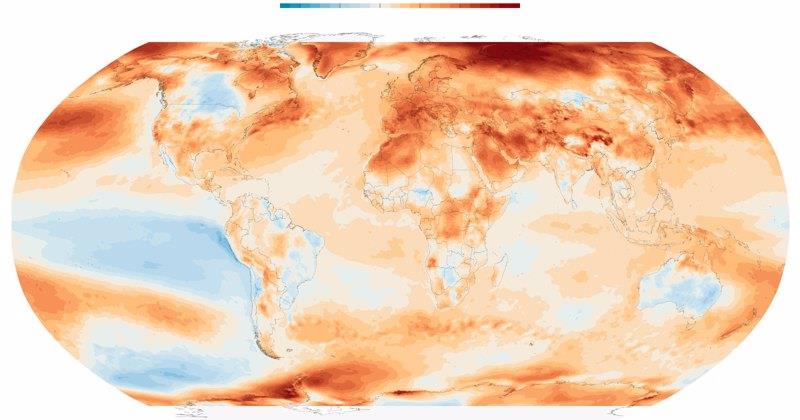
Warmest years and warmest ocean on record
by Daria Blackwell 18 Jan 2023 13:09 UTC

Warmest years and warmest ocean on record © Copernicus / ECMWF
2022 had much stand out news for many of the wrong reasons, two of them being climate oriented: the oceans were the warmest in recorded history and the last 8 years were the hottest on record.
Reliable ocean temperature measurements stretch back only to 1940, but it is likely the oceans are now at their warmest for 1,000 years and heating faster than at any time in the last 2,000 years.
The analysis, published in the journal Advances in Atmospheric Sciences, used temperature data collected by a range of instruments across the oceans. Separate analyses by Chinese and US teams were combined to calculate the heat content of the top 2,000 metres of water, where most of the heating occurs. The data shows that the oceans absorbed about 10 zettajoules more heat in 2022 than in 2021. According to The Guardian journalists, this is equivalent to every person on Earth running 40 hairdryers all day, every day.
The researchers also analysed salinity, which reached a record high in 2022, and stratification, where the layering of water by density intensifies. The long-term trend of increasing stratification continued in 2022. A consequence of less mixing in the ocean is that the surface layer absorbs less carbon dioxide from the atmosphere, further increasing global warming.
In a separate report, the World Meteorological Organization reported that the atmospheric concentration of all the main greenhouse gases - carbon dioxide, methane and nitrous oxide - had reached record highs. The heating of the oceans, and the impact on extreme weather, will increase until net zero emissions are achieved.
European Union's Copernicus Climate Change Service reported the eight warmest years on record have now occurred since 2014, with 2022 being the fifth-hottest. NASA and the National Oceanic and Atmospheric Administration (NOAA) also issued analyses of global temperatures for 2022, and their findings were similar. NASA's analysis ranked 2022 as tied with 2015 for the fifth warmest, while NOAA had last year as the sixth warmest.
Copernicus found that the 10-year average temperature for the period 2013-2022 is 1.14 degreesC above the 1850-1900 pre-industrial baseline. NASA determined that the world is now 1.2 degreesC (2.1 degreesF) warmer overall than it was in the second half of the 19th century.
Copernicus scientists reported that Europe had its hottest summer ever in 2022. Separate research has shown that heat waves in Europe are increasing in frequency and intensity at a faster rate than almost anywhere else, fueled not only by warming but also by shifts in atmospheric and oceanic circulation.
The Arctic has warmed nearly four times faster than the rest of the globe since 1979.
Eastern and Central China, Pakistan and India all experienced lengthy and extreme heat waves in 2022, and monsoon floods in Pakistan. The heat and accompanying dryness also contributed to drought and extensive wildfires in the Western United States and now to flooding with persistent atmospheric rivers. Extreme weather events are likely to continue until humanity achieves net zero emissions.
While 2022 was a La Niña year, an oceanic and atmospheric phenomenon that is the colder counterpart of El Niño, reversion to El Niño will bring stronger warming. The persistence of a cooling La Niña event, now in its third year, means that 2022 was not the warmest year on record, but is "only" the fifth or sixth warmest. "The rare event now would be to see a really cold year," said Carlo Buontempo, director of the Copernicus service.
Links and attachments
This article has been provided by the courtesy of Ocean Cruising Club.